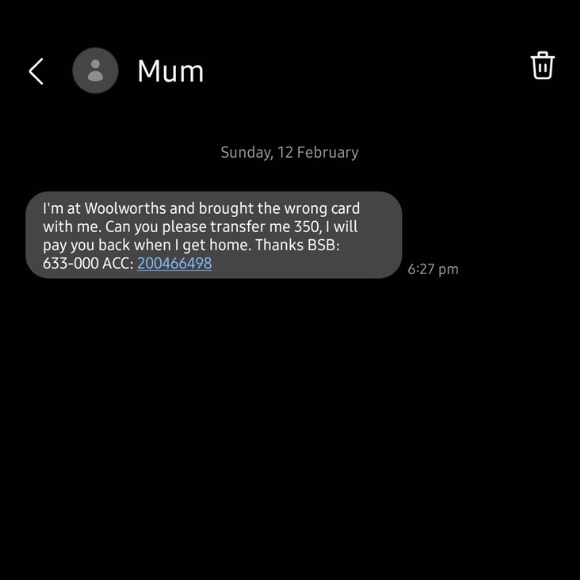
Over the past six months we have learned of major data breaches in large corporations, and many Australians have taken steps to avoid becoming victims of various scams. But if we receive a text or phone call from our bank – that looks genuine – how can we be sure it is?
The ACCC’s Scamwatch warned this week that scammers are using new technology to trick their victims, by making the call appear to come from the bank’s legitimate phone number or by sending a text that appears in the same conversation thread as genuine bank messages.
“We are incredibly concerned about bank impersonation scams because they can be so convincing, they are very hard to detect,” ACCC Deputy Chair Catriona Lowe said.
“What’s equally worrying about this particular scam, is that it is emptying every last cent out of victims’ savings accounts, with losses averaging $22,000 and more than 90 reports of losses between $40,000 and $800,000. This causes both financial and emotional devastation.
“We know of a man who lost over $500,000 after receiving a call from someone claiming to be from a major bank’s security department, wanting to know if a payment had been authorised.
“In another case, a man lost $38,000 after receiving a scam text message about a suspicious transaction. The scam text appeared in the same conversation thread as legitimate messages from his bank. He called the number in the text and was put through to a member of the banks’ fraud team. Unfortunately, it was an elaborate scam and he lost everything”, Lowe said.
Bank impersonation scams impersonate the big four banks as well as other financial institutions. And it’s no small matter; Scamwatch received 14,603 reports about bank impersonation scams in 2022, resulting in more than $20 million in losses. Total losses to phone and text scams increased significantly last year, with over $169 million lost.
Dodgy communications often have a sense of urgency to them, such as fraudulent activity raising red flags, or a frozen account.
“It is critical to remember that no matter how legitimate the call or message seems, a bank won’t ask you to urgently transfer funds”, Lowe said.
“If you receive an SMS with a telephone number to call, do not use it. Instead, call your bank direct on a number you have sourced yourself. Likewise, hang up if you receive a call from someone claiming to be from your bank requesting you to transfer money to ‘keep it safe’. Ask for a reference number and call your bank back using contact details you have found independently.”
Never provide online banking passwords, one-time security codes, pins or tokens to anyone over the phone. Contact your bank or financial institution immediately if you think you have been scammed.
“Following recent mass data breaches, many Australians were encouraged to monitor their accounts for suspicious activity. Sadly, this has led to consumers acting on these scam calls and text messages out of fear that their accounts have been compromised”, Lowe said.
Top tips for avoiding scams:
Stop – take your time before giving money or personal information.
Think – ask yourself if the message or call could be fake?
Protect – act quickly if something feels wrong. Contact your bank and report scams to Scamwatch.
Signs of a bank impersonation scam:
– There is a sense of urgency or threat to the message – “your bank account has been accessed”, “your bank account has been locked” “a payment has been made from your account. If this was not you, please call (phone number)”.
– The message looks different to other messages in the SMS thread, such as different wording or phrases used.
– The message may contain a suspicious looking link. Never click on links.
– The SMS has a telephone number to call – always find your bank’s phone number independently.
– The caller will tell you to transfer money to a different account to ‘keep it safe’ or for ‘further investigation’. This is not standard procedures for a bank. It is a scam.

